Iran Regime Continues To Suspend, Transfer Dissident Students

The University of Medical Sciences in Iran’s southern city of Bandar Abbas has suspended and exiled several students because they had supported the protests.

The University of Medical Sciences in Iran’s southern city of Bandar Abbas has suspended and exiled several students because they had supported the protests.
Reports say the disciplinary committee of Bandar Abbas University of Medical Sciences has suspended at least five students for several terms.
Two other medical students have also been exiled and forced to transfer to other universities.
In recent weeks, several reports have been published regarding the expulsion of students for their participation in nationwide protests following the death of Mahsa Amini in police custody in September.
The Student Councils Union of the country announced Friday that 16 students and two professors have been suspended in the southeastern city of Zabol in connection with the recent nationwide protests.
According to the latest report by the US-based Human Rights Activists News Agency (HRANA), at least 720 students were arrested during the protests.
In an interview with the National Public Radio in the US this week, Iran’s foreign minister Hossein Amir-Abdollahian claimed no students or journalists were arrested during the protests.
So far, the exact number of suspended and expelled students have not been announced, but in addition to Bandar Abbas University, there have been similar cases of punishments at other universities.
Back in December, 12 students were expelled and 80 suspended in Bahonar University of Kerman in central Iran. Similar reports have been published about the universities of medical sciences in Kerman, Shiraz in the south, and Tabriz in the northwest.

Germany has acknowledged an increase in spying by Iranian agents on exiled Iranians since the start of mass protests last year, Welt am Sonntag newspaper reported on Saturday.
Nationwide unrest triggered by the death of a young woman detained by Iranian morality police last year has led to "increasing indications of possible spying on opposition events and individuals" in Germany, the federal government said in response to an information request from the far-left Linke Party.
"Opposition groups and individuals (...) are considered by the rulers in Iran as a threat to the continued existence of the regime," the government said in its response.
It said the country's domestic intelligence service had identified 160 individuals with links to Germany as well as the Iranian Revolutionary Guards.
The Islamic Republic has persecuted exiled dissidents for four decades, often threatening, assassinating or kidnapping activists in Europe, including a former prime minister and several journalists.
The Revolutionary Guards' "extensive spying activities" are directed in particular against pro-Israeli and pro-Jewish targets in Germany, the newspaper cited the government as saying.
Demonstrations that first erupted in September over the death of a 22-year-old Kurdish woman who had been placed in detention by police enforcing the Islamic Republic's strict restrictions on women's dress have turned into the biggest protests in years.
Reporting by Reuters
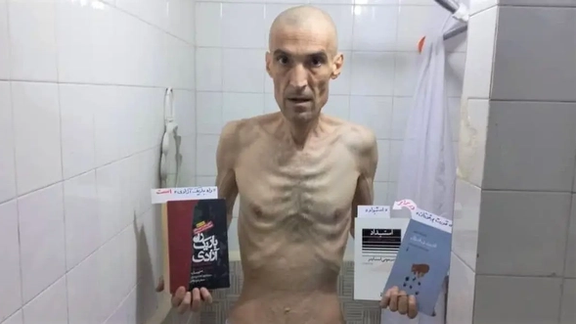
Iranian political prisoner Farhad Meysami, whose photos after long and repeated hunger strikes shocked the world earlier, has been freed after more than four years in detention.
Social media exploded after photos of Meysami along with his letter from Rajaei-Shahr prison in Karaj were published on social media on February 1, showing him in a horrible state after losing almost half his body weight. Himself a physician, Meysami had announced he would not stop his strike.
Many Iranian dissident figures and foreign officials expressed outrage and concern over his deteriorating health condition.
According to his lawyer, the 53-year-old prisoner of conscience, who has been in jail since 2018 for supporting women activists protesting against the mandatory Islamic dress code – or hijab -- began his hunger strike on October 7 to protest recent government killings of demonstrators.
In his letter from prison, Maysami announced that he plans to make the water he drinks bitter for the next 10 days as a symbolic move against "these times that are more bitter than poison." He held the Iranian government creating unbearable condition for "everyone in all aspects".
The political activist also wrote that “I will still insist on my three demands of stopping the execution of protesters, releasing six political-civil prisoners, and stopping forced-hijab harassment.” "I will continue my impossible mission in the hope that it may become possible later on with a collective effort,” he wrote. The title of the political activist's letter is "For the days of suffering and suffering and suffering".
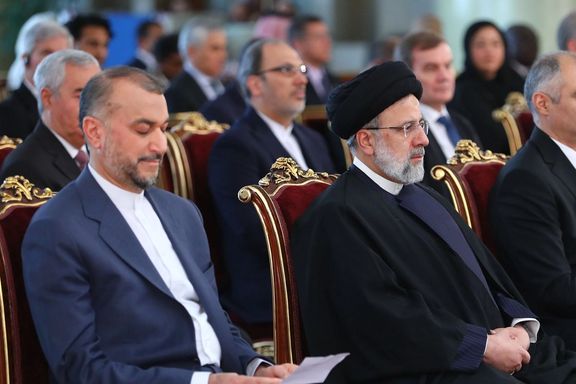
“Amir-Abdollahian must be the foreign minister of Switzerland, not Iran” quipped commentator Mohammad Mohajeri referring to his interview with the National Public Radio.
Mohajeri, a conservative pundit, was singling out Hossein Amir-Abdollahian’s remark in the NPR interview this week where he insisted that no journalists or students were arrested in Iran during the protests.
“I think Mr. Amir-Abdollahian is Switzerland’s foreign minister, not Iran’s,” Mohajeri was quoted as saying on Friday. He added that either Amir-Abdollahian is Switzerland’s foreign minister or is uninformed about events in Iran.
“What he has said contradicts all the available information in the media and in the world. These kinds of statements result in nothing but showing that our foreign minister is uninformed,” Mohajeri maintained.
He argued that President Ebrahim Raisi’s government has not presented any figures on how many people have been arrested during the protests. When officials remain silent, Amir-Abdollahian has no source to claim that no journalists and students were detained. Nevertheless, he emphasized that such gaffes discredit both the foreign minister and the government.
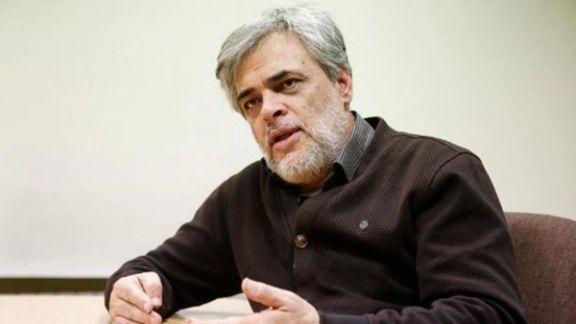
However, this is not the first time that an Iranian chief diplomat has tried to ignore or misrepresent facts in his attempt to defend the authoritarian regime. Former foreign minister Mohammad Javad Zarif, who was much more popular with Western media, regularly denied human rights violations committed by his government.
As far back as 2015 when Zarif was negotiating the JCPOA nuclear deal with the United States, he told PBS that “We do not jail people for their opinions… But people who commit crimes, who violate the laws of the country, cannot hide by being a journalist, being a political activist.”
At the time, these remarks led to a lot of backlash, but Iran’s human rights violations were not the priority of Western powers during the race to sign a nuclear agreement.
In the 2019 Munich Security Conference Zarif refused to answer BBC’s questions about Iran’s human rights record and the jailing of eight environmentalists for no reason. Instead, he immediately brought up Jamal Khashoggi’s killing and Britain’s arms sales to Saudi Arabia.
But by then Zarif was bitter about the US decision to pull out of the 2015 nuclear deal and Iran’s growing isolation, while for years he had tried to woe the Western media by smiling into the cameras.
Meanwhile, a former official Hamid Abutalebi criticized President Ebrahim Raisi’s remarks on Thursday during his meeting with foreign ambassadors on the occasion of the Islamic Republic’s 44th anniversary.
Raisi had nothing new to say about Iran’s nuclear dispute with the West, Abutalebi noted, simply repeating the same punchlines that would not impress anyone.
Iran is ready for a “just” agreement and always shows good will to achieve it, Raisi said. The United States, and lately its European allies, are immersed in “delusions and miscalculations,” Raisi added.
What the diplomats who were present read in these remarks, Abutalebi argued, was that Iran is not ready to finalize the nuclear negotiations and secure the lifting of sanctions. “A good agreement for Tehran is insisting on its old demands,” he quipped.
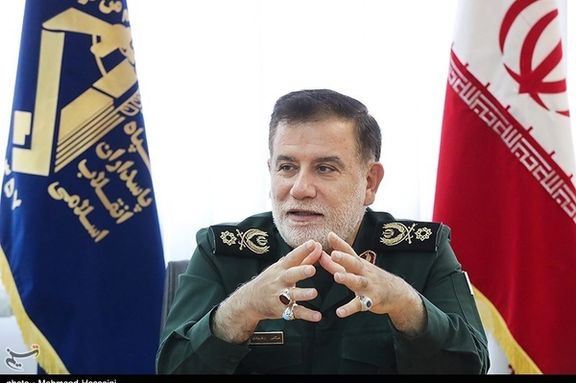
As the Islamic Republic is celebrating the 44th anniversary of its establishment, top military commanders Friday issued threats warning of consequences of “enmity with Iran.”
The Revolutionary Guard’s Deputy Commander for Operations Abbas Nilforoushan said that the US has paid a heavy toll for its enmity with the Islamic Republic, warning the European countries for their positions against the regime.
Repeating the Islamic regime’s propaganda line that blames foreign countries for the ongoing protests triggered by the death of Mahsa Amini in mid-September, Nilforoushan said the enemies did their best to instigate “riots” across the country. “They activated their operational bases in the region and the US, and orders for riots were constantly issued from these bases," he said.
Islamic Republic officials use the term “enemies” to refer to the United States and its allies.
He also defended the regime’s intensified military crackdown in Kurdish-majority areas and bases of Iranian Kurds in Iraq, saying that the IRGC “smashed the center of sedition in the Kurdistan region with point-blank missiles.”
Defense Minister Mohammad-Reza Gharaei Ashtiani said the Islamic Republic has the capability to identify the weaknesses and vulnerabilities of the enemy and plan how to hit them. He also claimed that the country was dependent on the West before the 1979 revolution, saying “The Shah's government was a dictatorial regime completely dependent on the West.”
Also on Friday, IRGC Ground Forces Commander Mohammad Pakpour said despite various conspiracies by the enemies, the Islamic Republic is at the peak of its power and the people of Iran will deal a decisive blow to the enemies on the anniversary of the Islamic Revolution. By “dealing a blow,” he was probably referring to a large turnout in the state-sponsored celebrations and street rallies on February 11.
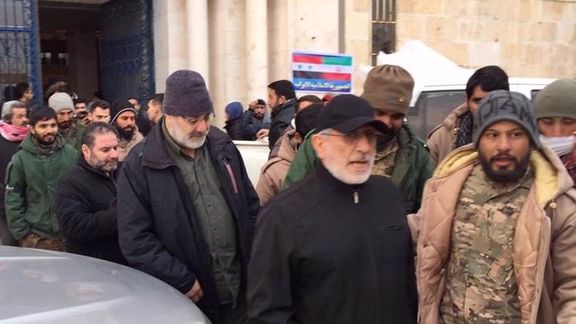
Israel has warned the Islamic Republic against sending arms to Syria under the guise of humanitarian aid meant for the earthquake hit people of the country.
The Saudi-owned Elaph news site quoted an unnamed Israeli military official as saying any move by Tehran to send weapons to Syria will be met with military response by the IDF "without hesitation.”
“There is information indicating that Iran will take advantage of the tragic situation in Syria” and ship weapons to the Hezbollah terror organization and other Iran-backed groups in Syria, the source said, adding that Israel would not accept this and it would result in a “firm military response from us without hesitation.”
Several Iranian cargo planes reportedly carrying aid have landed in Syria since Monday’s major earthquake in southeast Turkey, that has killed more than 20,000 people in both countries as of Thursday evening.
Esmail Ghaani, who heads Iran’s Revolutionary Guard extraterritorial Quds Force, was seen in Aleppo on Wednesday to supervise Iranian rescue operations.
Several airstrikes against alleged Iranian weapons shipments disguised as seemingly harmless products have been attributed to Israel in recent years, including last month.
Israeli air strikes targeting Iran-linked assets in Syria focused on airports as the Islamic Republic is trying to step up its presence while Russia is entangled in Ukraine.
Israeli and American officials have reportedly made a deal to cooperate over covert and semi-covert operations inside Iran.
Late in January, a drone attack hit a military factory in the central city of Esfahan. Blaming Israel, Tehran vowed revenge for the latest episode in a long-running covert war.